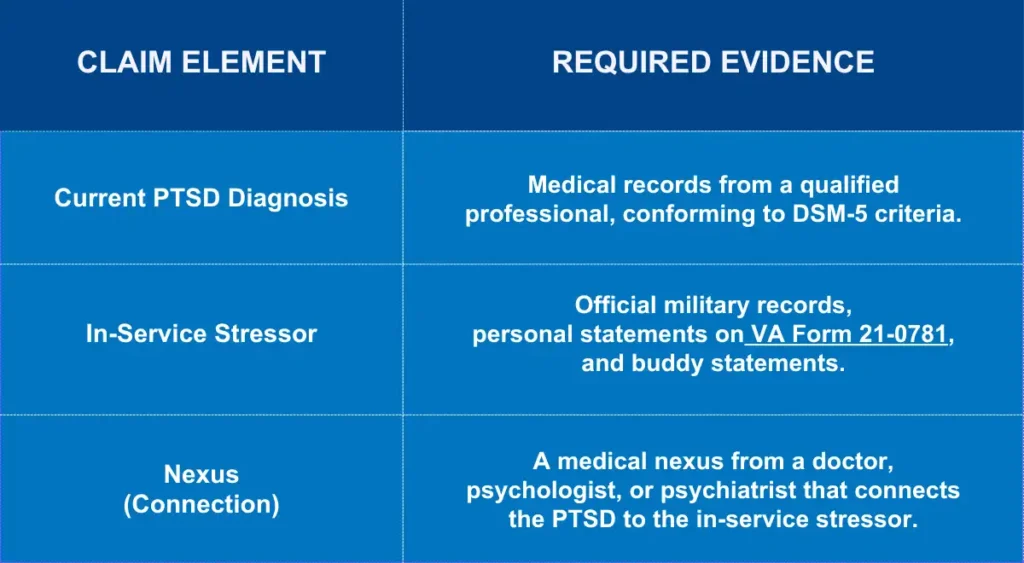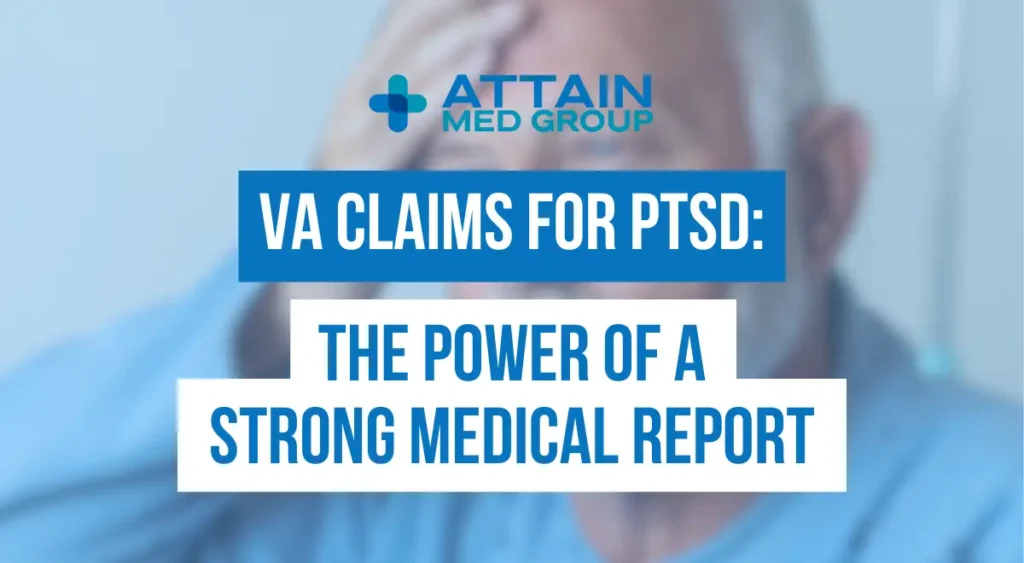Are you a veteran struggling with Post Traumatic Stress Disorder? Securing VA disability benefits can be challenging. The key to a successful claim for service-connected disabilities often lies in the strength of your medical evidence. When it comes to VA Claims for PTSD: The Power of a Strong Medical Report can make all the difference in your mental health condition.
You deserve disability compensation for any health conditions caused by your military service. What kind of medical report truly helps your claim for disability benefits? What information is important to gather as additional evidence, and how can you get it? Let’s walk through the steps together to help support claims for service connection.

Understanding PTSD and VA Disability Claims
Post-Traumatic Stress Disorder, or PTSD, is the number one mental health condition that veterans deal with. According to the VA, PTSD is one of the most prevalent mental health conditions they see in service members. It’s also the sixth most common disability claim overall. To claim service connection for PTSD, you must prove that your diagnosis is legitimate through credible medical records.
Many service members struggle with the heavy toll that military service takes. A detailed, evidence-backed report is necessary to link your PTSD to your military service to obtain VA disability benefits. Understanding PTSD is key to getting disability compensation from the VA.
What the VA Looks For in a PTSD Claim
You may wonder what is important to the VA when you submit a disability claim for mental health conditions. The VA mainly wants to verify a few things when they determine eligibility. These things include a current diagnosis of PTSD and an in-service stressor or traumatic event.
Then, there needs to be a connection, also called a medical nexus, that your PTSD symptoms are from your military service. This all needs to be backed up by credible medical evidence. A solid medical report is key to proving each aspect of your claim to get a higher VA rating.

The Disability Benefits Questionnaire or DBQ for PTSD Review will be thoroughly reviewed to help the VA determine eligibility. Having credible documents is how the VA will assign you a rating and determine your compensation eligibility. So, get familiar with how they make decisions.
Why a Strong Medical Report Matters
A strong medical report helps significantly increase the chance of the VA understanding your health disorders. A good report leaves no room for doubt about your PTSD and service connection. You want your disability rating to reflect where you’re at today.
Remember, you’re trying to show a real health condition exists because of your military service. Here is what the components of your VA claim need to get monthly payments. Obtaining additional compensation and VA benefits depends on the medical report.

Key Components of a Powerful Medical Report
A winning report should include some details for the VA rater to use in their evaluation for service-connected disabilities. This report starts with your PTSD diagnosis and is more compelling when coming from a licensed psychologist or psychiatrist. You can use the information in the DBQ for PTSD review for reference when detailing symptoms to the examiner.
A link between military service and diagnosis and medical expert opinions are some other parts of the report that are key to a compelling, well-researched and credible claim to help the VA determine eligibility. Strong medical reports can help support claim success.
But there are more steps you should know when working with the VA, to help support claim approval and get what you deserve for your health condition. Let’s explore these components further and the medical evidence that support a successful claim for disability compensation for mental health conditions.
Here are several parts needed in order to support VA claims to obtain disability compensation:
- Comprehensive Diagnosis: Your report needs to confirm that you have PTSD according to DSM-5 criteria. Your health care providers can confirm a diagnosis.
- Detailed Symptom Analysis: The VA Disability Benefits Questionnaire (DBQ) for PTSD can help show this. All 31 mental health symptoms in the questionnaire need to be documented to meet the condition VA.
- Nexus Statement: To secure a service connection to your current health concerns, a strong medical opinion needs to clearly state the link to your military service is why you’re struggling today. This statement makes your VA claim much stronger and it’s a requirement for service connection.
- Impact on Daily Life: The degree to which a disability negatively effects your ability to function normally and how bad your bad days are needs to be stated within your exam. Many health care workers gloss over this element in their examination but you want them to spend considerable time and discussion of how social impairment, family life, work, life and military events play in all this.
Getting an Independent Psychological Examination (IPE)
Think of the IPE as an extra, unbiased look at your mental health. An Independent Psychological Examination or IPE provides you with objectivity and medical evidence. A licensed psychologist can give it, offering a neutral view of your symptoms, diagnosis, and how things affect your daily activities.
Sometimes, an IPE is much more detailed than what the VA provides during their examinations. The information that goes into an IPE exam goes hand-in-hand with your own presentation when you submit evidence. Here’s the info needed when you file claim for mental health.
- Objective Symptom Assessment: An IPE digs deep into your symptoms to see if symptoms meet criteria. They want to reveal their true intensity so there is full transparency on the events and military operations that led to this, as VA Office of Research & Development on PTSD is designed for.
- Unbiased Medical Opinion: A good IPE provides an objective look at everything, separating it from a conflicted personal view. This objectivity improves the credibility and believability for your rater to approve your VA claim to obtain disability compensation.
- Supporting the Nexus: With a rock-solid report and clear details, there is little room left to wonder “why is this happening” and helps your claim succeed to receive your VA benefits. Also, a rock-solid Independent Medical Opinion will provide credibility for medical reports again that otherwise would’ve held back progress on PTSD VA claims to receive compensation based.
A mental health expert doing the IPE knows what to look for and gets it right to obtain VA benefits. It is advisable to do some additional research. Then get the most thorough evaluation you can when filing claim.
What to Expect During an IPE
Are you nervous? Let’s see if we can put your mind at ease about your appointment to file claim for mental health conditions. Before your exam, compile all important details of your military experience to communicate when you file claim. Get ready for many, many questions and keep a notebook handy. If a new provider wants to know what you went through, what ails you, and how bad it hurts, then all is well. Keep them as your provider.
Also, to get the best results for your evaluation, it’s important to open up so the Independent Medical Examiner can accurately reflect your health issues and help support claim approval. Let’s see what this looks like:
- Detailed Interview: You will be asked about your past and present in your life. Trauma events you experienced and current triggers will be addressed for this mental health condition. Your family, friends, and coworkers will also get discussed, and how you all get along and how they cope with all your outbursts. It may even come up on if you qualify for VA benefits.
- Psychological Testing: Tests are used to evaluate PTSD markers like anxiety and depression to provide proof to make service connection possible, because a medical report has barred you from doing so in the past.
- Review of Records: A records evaluation means someone took time to connect the dots of military operations you did to the problems you have now, for the full history for a winning claim, just in case there are additional forms needed for a mental health disorder. But, medical files in the VA are sometimes missing records, so it’s wise to assume they did NOT read your files and you need to submit evidence.

Preparing fully before the appointment gets you the results you want, to get you what you need. When you’ve provided credible insight on yourself and how it truly impacts you daily, the IPE can clearly define the proper PTSD assessment for your VA claim. It’s important to gather evidence from a traumatic event.
Nexus Letters: The Bridge to Service Connection
A nexus letter directly ties your PTSD diagnosis to your military service. This letter should include very specific data, along with language that the doctor or psychologist is confident with their opinion. Without a solid Nexus letter your disability compensation will fail to get you disability benefits.
According to Brian Reese, author of “VA Claim Secrets”, it needs to be well-researched and credible for the VA to sign off on it and receive disability benefits. The statement you read has also been said in his book VA Claim Secrets that highlights everything about your specific operations while enlisted. Let’s explore what kind of insights should go into your nexus statement in VA claims.
- Clear Connection: There can’t be doubt in their decision, and this is how a medical nexus builds a connection for service to support claims. How things connect should be spelled out in a credible and legitimate way and in common English to relate it clearly to what’s wrong in the medical evidence for service when trying to support claim success.
- Medical Rationale: If your doctor has been treating for the health issues, the symptoms analysis might even have additional supporting literature or even journal entries which make nexus statements all the more credible for compensation purposes. What a VA rater reads should include logic and reasoning using medical literature.
- Expert Opinion: To improve trustworthiness for both the medical nexus itself, be mindful to search for an examiner with actual specialties and expert understanding of veterans mental issues. Don’t rely on people without a degree on PTSD disability, unless it’s personal testimonials for emotional backup during your appointment to claim VA.
Other Evidence to Support Your Claim
A comprehensive medical report provides everything in black and white when you claim VA. The other aspects we are detailing today is to add onto those claims that help paint you and give further medical evidence with DBQ’s for mental health conditions. The supporting documents are how they back up a legitimate disability, in order to determine eligibility.
There are four main supporting evidence routes that provide an effective appeal:
- Lay statements: A witness describing certain problems they’ve seen are common here. Family members describing personality shifts and behaviors helps too, even simple friends are able to give you feedback to get VA benefits. Even some people from online help to claim VA.
- Service records: This validates any kind of operations you may of have gone on during your time serving, which will determine eligibility. Also remember this helps validate stressors with names and location from that VA Claim from VA Form 21-0781. You can ask the team over at Keefe Law Firm to assist if you file claim.
- Medical records: Always go back to doctor appointment notes for PTSD in medical files so there are no discrepancies, which will determine eligibility. You want it accurate to prove how legitimate the medical records show in the independent psychological reports you submit, with this knowledge will boost how other reports connect in service and meet the condition VA when you claim VA.
- Buddy letters: Buddy Letters validate the trauma you claim as an authentic reflection from another set of eyes as if you lived in their body at those operations as they share the experience to help determine additional forms with your application for disability and mental health condition.
These extra layers of data prove your claims further than anything and it’s crucial so you succeed and paint the reality to improve transparency in VA disability ratings to obtain disability compensation. So let’s circle back to support claims.
How VA Claims for PTSD Can Get Easier
Getting medical reports doesn’t need to be hard when you submit evidence to claim VA. So, you’re on the road and want an edge when talking to psychologists in and out of the VA system. That’s excellent because those reports from private practices will show exactly what needs attention to secure favorable rulings as you search out examiners like that after a review of the facts of that DBQ for PTSD review to determine eligibility.
With VA Claims for PTSD: The Power of a Strong Medical Report helps make a good PTSD claim overall.

Conclusion
The key to a successful VA disability claim for PTSD isn’t just about proving you have a health condition, but how and why. You need an Independent Psychological Examination or other exam backed with records for review to leave little to no doubt about the claim with the help of that medical examiner that connects what happen in service with a good medical report. This may provide success to obtain VA benefits.
When you use the knowledge shared here and present solid medical evidence that shows you have a condition that came from events that hurt you, as the Independent Psychological Evaluations can lead for, you make the VA disability claim process more manageable overall as you better navigate how and what of getting those VA benefits. Leading to high medical ratings in that VA claim overall with the insight into that VA Claims for PTSD: The Power of a Strong Medical Report that we are walking towards today and obtain disability compensation. Veterans with PTSD can get the help and support they need by filing claim with the right evidence.

